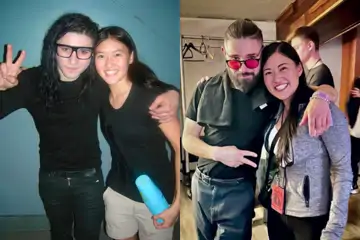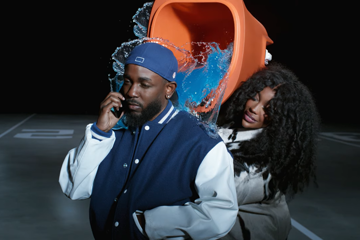The most surprising thing about Pitch Perfect is that it's apparently based on a book. And not just on a screenplay in which someone took the script to Bring It On and did a Find/Replace in which 'a cappella group' was submitting for 'cheerleaders'. This is both critique and praise: sure, it's a straight-up, second-rate facsimile of Bring It On, but if you're going to rip something off, at least go for one of the '00s' definitive teen-movies. Here, Anna Kendrick plays the alt cynic —all thick black eyeliner, piercings, and glowering, ironic deadpan— who falls in with the girly crowd, slowly lets down her defences, then teaches them the value in doing something fresh. She's a budding mash-up DJ/producer, and, well, her narrative arc is effectively laid out in front of her from the beginning. The instant she arrives on campus, she sees a guy in a car, and, of course, he's the oblig love-interest; having them on rival a cappella groups —thus making their flirtation somehow semi-forbidden— doesn't really do much to add to the sexual tension; and, they have lots of lame falling-outs where Kendrick is mean and glowering for no real apparent reason (or: her parents divorced, the reason for everything). Though its central narrative is of their relationship, the film is, moreso, about her character opening up to female solidarity and group friendship; about her spending time around girly girls, and letting those emotional walls come tumbling down.
The music in the film is meant to be a succession of rousing showstoppers, but it's wall-to-wall horrible. For a picture apparently devoted to a cappella singing, human jukeboxing, mouth-music, etc, Pitch Perfect is actually terrified of the human-voice; every moment of spontaneous singing actually a pantomime miming a pitch-corrected, echo-draped, dynamic-range-compressed studio concoction built for soundtrack CDs. When a person sings sans backing, it's a moment of true human vulnerability; yet, when voices combine, it can rise into a feeling of true communalism, solidarity, and emotional power. Pitch Perfect robs us of all that; it's not quite like seeing Hilary Duff's shitty voice being studio-glossed to death in the hilariously-awful (John Corbett as a sexy teacher!) Raise Your Voice, but, musically, it's barely much better; Kendrick's apparent alt bonafides apparently including a yen for horrendous chart dreck, not some love of Diplo or Girl Talk.
Of course, in many ways, the music is immaterial to the story; Bring It On succeeding in spite of depicting a 'sporting' world that is essentially one step removed from stripping, and has patriarchal condescension and reductionist misogyny deep at its core. And, as Pitch Perfect goes through the standard sports-movie tropes —yes, this rag-tag bunch of misfits may indeed rise to the occasion for the Big Final, even if they encounter hilarious failure along the way, often involving copious amounts of vomit— it comes to succeed as ensemble comedy. It's supporting players are comic caricatures, but good ones; Hanna Mae Lee plays an inaudible quiet-talker who no one can understand; Elizabeth Banks and John Michael Higgins play TV commentators imported wholesale from a Christopher Guest picture; and, best of all, there's Rebel Wilson, who swings wildly between underplaying and overplaying her high-comic turn as 'Fat Amy', and harbours a transgressive spirit that makes the film feel more on-edge than it ever really is, and instils a sense of genuine agency in a character that, in worse films, would be the brunt of jokes, rather than the centre of them.

Love Is All You Need
Love Is All You Need looks like the kind of film the old lady sitting next to you on a long-haul plane flight would be watching. It stars Trine Dyrholm as a down-and-out hairdresser who —woah, symbolism— has lost her hair to cancer, her husband to a slutty secretary, and her dignity to the ravages of time. And, just as her marriage is falling apart, she's off to an Italian villa for her daughter's wedding, and at the airport she runs into the car of rich jerk Pierce Brosnan. Who —sha-boing!— is actually the father of her future son-in-law. And don't they just hate each other! But could that initial hatred —she lower-class, he upper; she sunshine and light, he a glowering prick— actually mask desire? Um, yes, yes it could. With the set-your-watch-by-it predictability of the most formulaic rom-com, we must submit to the tedium of wondering whether this two aging-yet-still-hot leads, nursing broken hearts and with tragic back-stories ready to be revealed in the second act, will eventually end up together. Um, yes, yes they will. Along the way, we're treated to a bunch of screaming, heinously-unfunny stereotypes; with, for example, the amazing Paprika Steen reduced to playing a screeching harridan fake-tanned-and-red-hair-dyed a top-to-toe shade of terracotta. It's a film that trots out the tired tropes of the wedding-where-nothing-goes-right; when Steen stands up to make a drunken speech, you can literally feel the unfunny radiating out from the screen. It also turns out that the groom-to-be is totally a closeted fag and all; which is presented with all the subtlety and sensitivity of a laugh-track sitcom; there's no need to spoilerzzz that shit because Sebastian Jessen couldn't have played his snivelling-daddy-issues punce more Secretly Gay had he been trussed in leather chaps (and in 2012, a year of awesome leather-chaps-movies, maybe this would've been an improvement).
Don't miss a beat with our FREE daily newsletter
Perhaps, reading the synopsis for a horrendous piece of middle-brow, old-lady-friendly genre cinema, you're wondering what your old pal Film Carew was even doing watching Love Is All You Need. Well, I haven't got to the saddest part of the whole affair: it was directed by Susanne Bier. In a world not exactly teeming with female auteurs, Bier had carved out an awards-show-blessed place in the cinematic canon; becoming a fervent practitioner of scorching, abrasive, brutal melodramas; in which she used realist form —2002's Open Hearts was a Dogme movie— to give her contrived dramatic scenarios a sense of fearsome, unwavering dramatic power. Sure, way back she made the reprehensible Swedish karaoke comedy Once In A Lifetime, but since she had found quite an artistic niche: Open Hearts, Brothers, After The Wedding, and In A Better World a run of profound pictures loaded with themes of fidelity, masculinity, the after-effects of violence, and flawed attempts to 'do good' in a globalised world that's always screwing someone over. Were Bier's name not on the credits —and were half the dialogue not in Danish, and the Zentropa logo not on opening— there'd be almost nothing to connect Love Is All You Need to her. This is a shitty commercial 'comedy', and nothing more.















